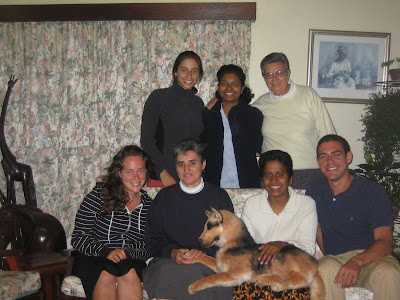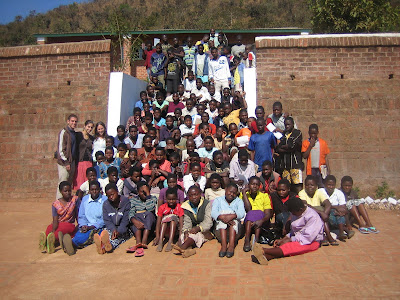 It was a forwarded message but the introduction was personalized, and it read: “I heard you might be looking to get out of the country again…”
It was a forwarded message but the introduction was personalized, and it read: “I heard you might be looking to get out of the country again…”So that’s how my trip to Malawi began. On July 30th I and my two fellow travelers, Talia and Ilana, set out for ‘The Warm Heart of Africa’, and after 36 hours and three flight transfers we arrived, a bit delirious but happy nonetheless.
Our first taste of Malawi came with the drive from the Airport to St. Mary’s. The landscape of Malawi is beautiful, and in that travel-weary state it reminded me of Italy – big, rolling foothills, wide open valleys, spectacular views – only the colors were different. Everything was a dried out brown instead of lush green (I later learned that during the rainy season, this is not the case).

And if the landscape was beautiful, the roadside scenery was striking. Downtrodden storefronts with no windows, small clusters of straw-roofed shacks with no doors, children walking the street barefoot and shirtless. The poverty was evident and everywhere, and I think all three of us were nervously waiting to see where the car would stop.
When we arrived at St. Mary’s (which, if you don’t know, is an orphanage and rehabilitation center where Melissa and Jeremy lived and through which Goods for Good often sponsors distributions) I was surprised and delighted. It’s a beautiful campus, green with nice buildings, windows and all. It reminded me of summer camp, really; there was a directors’ house, boys and girls’ bunks, a rec hall, mess hall, staff quarters and a soccer field. We were made to feel even more at home by Sister Rosemary, who picked us up from the airport and was at once kind and accommodating. All the Sisters were. We ate dinner at their house that night. It was delicious.
Above I described the poverty that faced us everywhere outside the walls of St. Mary’s.
 I should elaborate by saying that the people of this country, their personalities and outlook, are in no way indicative of their surroundings. As time passed and we met several Malawians, at school, around Chezi (the town we were living in) and in travel. We were all amazed at how friendly, earnest and eager to talk they were. Nowhere did we meet a Malawian who seemed bitter or resentful, despite the conditions all around them.
I should elaborate by saying that the people of this country, their personalities and outlook, are in no way indicative of their surroundings. As time passed and we met several Malawians, at school, around Chezi (the town we were living in) and in travel. We were all amazed at how friendly, earnest and eager to talk they were. Nowhere did we meet a Malawian who seemed bitter or resentful, despite the conditions all around them.This attitude was most obviously embodied by the children we got to know at St. Mary’s, as well as those who came to school at St. Matthias from surrounding villages. Here were kids who had in some cases lost everything (their parents), and were still generally cheery and fun loving.
And smart! Once we started teaching we were surprised again – this time by how well behaved and eager to learn the kids were. They gave us their full attention, didn’t talk in class, and were just wholly better than any American middle school class I’d ever seen.
Not only were they attentive, but most of them had a surprisingly firm grasp on the subjects covered in class. Malawi’s primary school system, its classes and exams, are all done in English, a second language (at best) to each student. I taught science, and was worried about all the specific terminology it would involve, but the students successfully navigated tough concepts like electricity, air pressure and properties of sound waves. Surprising.
 Still, the issue of English-language classes in areas like science, math and social studies puzzles me. In a country where children are struggling to stay focused and even to attend school, the language issue presents another significant challenge to those trying to better their station in life. And while the better students typically speak functional English, a lot of the slower kids don’t. For all I know they might not be slower at all, because as I moved to individual help it became clear that for some children not knowing the answer wasn’t the problem; they didn’t understand the question. This was and is a challenge I have to applaud these kids for rising to.
Still, the issue of English-language classes in areas like science, math and social studies puzzles me. In a country where children are struggling to stay focused and even to attend school, the language issue presents another significant challenge to those trying to better their station in life. And while the better students typically speak functional English, a lot of the slower kids don’t. For all I know they might not be slower at all, because as I moved to individual help it became clear that for some children not knowing the answer wasn’t the problem; they didn’t understand the question. This was and is a challenge I have to applaud these kids for rising to.Congratulations are also due to the staff of St. Matthias primary school. Mr. Banda, the headmaster, was very welcoming to us and is clearly respected by his students and coworkers. The other teachers we came to know are good people, and all share an admirable commitment to their work. They do a great job and St. Matthias is consistently one of the top schools in the country. Still, the lack of simple learning tools is immediately apparent, and I found myself distributing notebook paper and pens from my backpack on a daily basis, so much that I ran out. The kids couldn’t even take notes. This illuminated for me the importance and necessity of the type of work being done by Goods for Good and other organizations.
On that topic: there was one Sunday when Aaron, a Malawian employee of Goods for Good, took us on a drive through the country to visit some of the other projects the organization is involved with.
 We went first to the organizational center of Consol Homes, a Malawi-based aid organization. The structure, partially sponsored by Goods for Good, houses certification in carpentry and tailoring for older students as well as after school care for younger ones. We also visited a small village home to the founders of Tiyambe Nawo (another Malawian NGO), Mr. and Mrs. Benis. They invited us to lunch in their home (nsima, nsima, nsima) and later we visited the newly constructed community center/nursery schoolhouse, a project funded by Goods for Good. Mr. Benis pointed out to us the community’s former schoolhouse; it was a small shack caught in the middle of collapse, one you or I would probably take for an old tool shed. When we saw the Goods for Good label on the brand new building – and I believe I can speak for my partners here – we felt a great deal of pride to be representatives of such a cause.
We went first to the organizational center of Consol Homes, a Malawi-based aid organization. The structure, partially sponsored by Goods for Good, houses certification in carpentry and tailoring for older students as well as after school care for younger ones. We also visited a small village home to the founders of Tiyambe Nawo (another Malawian NGO), Mr. and Mrs. Benis. They invited us to lunch in their home (nsima, nsima, nsima) and later we visited the newly constructed community center/nursery schoolhouse, a project funded by Goods for Good. Mr. Benis pointed out to us the community’s former schoolhouse; it was a small shack caught in the middle of collapse, one you or I would probably take for an old tool shed. When we saw the Goods for Good label on the brand new building – and I believe I can speak for my partners here – we felt a great deal of pride to be representatives of such a cause.Now that I’m back, people often ask what will I miss most about Malawi. Here is the answer: having a position of modest importance in the lives of the children of St. Mary’s and St. Matthias. They all became good friends, and I like to think they enjoyed having us around.
I owe a huge thank you to Goods for Good who gave me the opportunity to go to Africa. Thanks also to the staff of St. Mary’s – Sisters Victoria, Parfalia, Sheba, Shinee and Rosemary, and John Mwanza, as well as the staff of St. Matthias, Mr. Banda, Mr. Nkhota, the other Mr. Banda and all the rest of the teachers there. Lastly, thank you to Talia Kraemer and Ilana Kahn for being great friends, teachers, and roommates. And chefs.


No comments:
Post a Comment